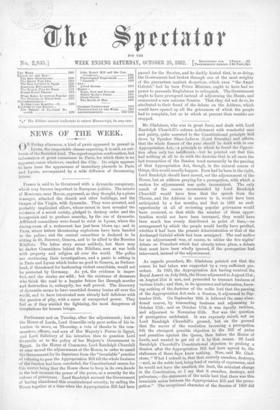Mr. Gladstone, who was in great force, and dealt with
Lord Randolph Churchill's solemn indictment with wonderful ease and gaiety, quite assented to the Constitutional principle laid down by Speaker Shaw-Lefevre (Lord Eversley) and others, that the whole finance of the year should be dealt with in one Appropriation Act,—a principle to which he found the Opposi- tion often only too indifferent,—but he pointed out that this had nothing at all to do with the doctrine that in all cases the last transaction of the Session must necessarily be the passing of that Appropriation Act, though, in the natural course of things, this would usually happen. Even had he been in the right, Lord Randolph should have moved, not the adjournment of the House, but an address praying for a prorogation, with which a motion for adjournment was quite inconsistent. The only result of the course recommended by Lord Randolph Churchill would have been that the speech from the Throne, and the Address in answer to it, would have been anticipated by a few months, and that in 1883 no such opportunity at all of reviewing popular grievances would have occurred, so that while the number of these oppor- tunities would not have been increased, they would have been much less evenly distributed in point of time,—an arrangement by which the people would hardly have profited, whether it had been the present Administration or that of the Archangel Gabriel which had been arraigned. The real motive for an adjournment was, of course, to utilise the five nights' debate on Procedure which had already taken place, a debate that must have been wholly ignored, if the prorogation 'had intervened, instead of the adjournment.


































